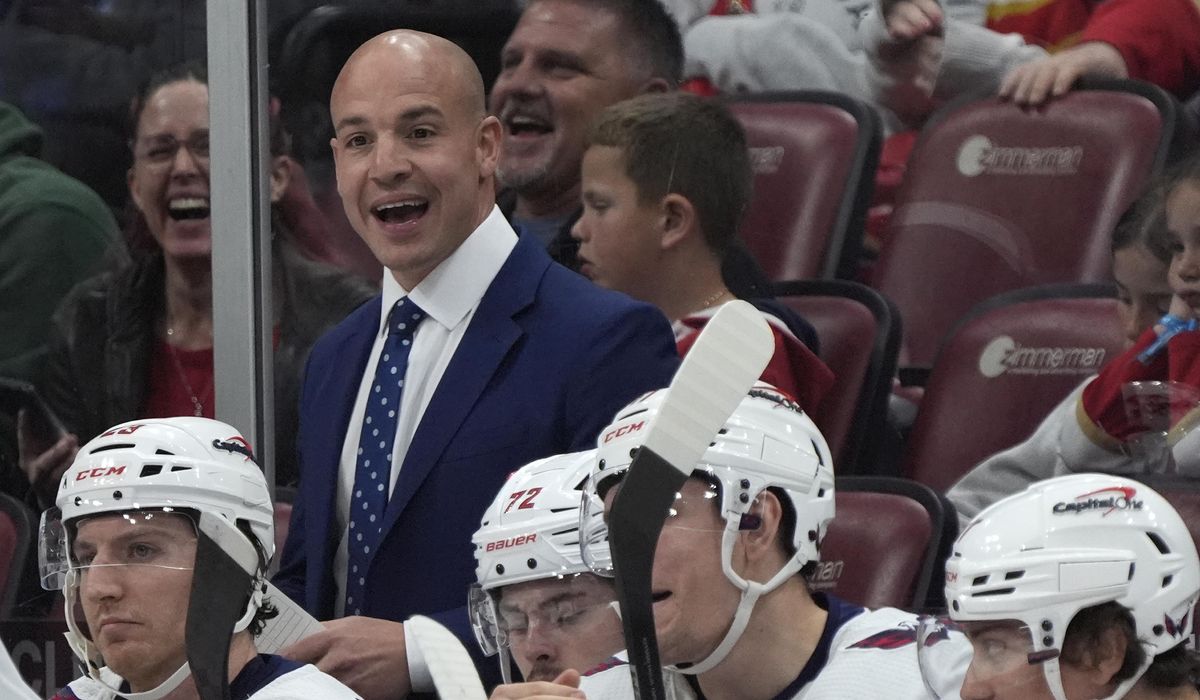


Legendary coaches like Georgetown’s John Thompson, Maryland’s Lefty Driesell and the Redskins’ Joe Gibbs are long retired. New blood has entered the District’s coaching ranks, and they’re working together to galvanize their teams and their fanbases.
Every major professional head coach in the District — including the top names with the NFL’s Commanders, NBA’s Wizards, MLB’s Nationals, WNBA’s Mystics, MLS’s D.C. United and NWSL’s Spirit — has been on the job for less than three years.
The Capitals’ Spencer Carbery, who won the NHL’s Jack Adams Trophy as the league’s best coach last season, is the city’s longest-tenured professional coach with two seasons under his belt.
As the fresh faces have tackled their new jobs head-on, a growing camaraderie is becoming increasingly evident.
“There’s room for all of us. Not every town in America can carry and support all of these different teams with equal fervor. I’ve gone to Spirit games and it’s full,” he said. “Whether it’s baseball or soccer or football or basketball, it seems like D.C. has enough love for all of them.”
Commanders coach Dan Quinn proudly hosted Wizards coach Brian Keefe at an offseason practice, picking the basketball mind’s brain about player development and scouting. Carbery was recently spotted cheering on interim manager Miguel Cairo at Nationals Park. Mystics coach Sydney Johnson, still in his first season with the team, has enjoyed becoming a Washington sports fan.
“It has nothing to do with any scheme or that, but I’m curious to find out: is there another way? Is there a different method to go about it?” Quinn said of his conversations with coaches across sports. “And I love learning, so I gain a lot from those moments. Whether it’s college basketball, pro ball, all of it matters to me.”
The coaches aren’t competing with each other, they separately told The Times. Johnson proudly poached ideas from the Wizards coaching staff — a process made easier by the fact that the teams share a practice facility and an ownership group.
“Able to kind of just pick their brains and steal things from them in terms of development and practice schedules and how to approach the season,” Johnson said. “With the hockey team, seeing what it looks like at a championship-contending level. Seeing with the football team, a magnetic player comes into town and galvanizes a team to a championship-contending level. Just seeing the process with how to go about it, and then there’s personnel.”
Quinn had seen it from afar during his last coaching stop, as the defensive coordinator for the rival Dallas Cowboys. He wasn’t prepared for the ways the dormant fan base would ignite when rookie quarterback Jayden Daniels thrust the team back into national relevance.
“Sometimes you can feel isolated because you’re at home or work, home or work. To feel that connection start to take shape, the fan support of the players and on the field. Home field [advantage] is a real thing,” Quinn said. “That’s pretty exciting.”
These aren’t the days of Vince Lombardi, who arrived in the District feeling the need to note that he can’t walk across the surface of the Potomac River “even when frozen.”
“You cannot be successful in football — or in any organization — unless you have people who bend to your personality,” Lombardi said at his first press conference in Washington in 1969. “They must bend or already be molded to your personality.”
These days, the District’s newest coaches shower praise on their assistants. Quinn lobbied for his coordinators to receive head coaching opportunities with other teams this offseason. When they opted to stay with the Commanders, he ceded control of the team to them for an intrasquad scrimmage on Tuesday.
“If we raise the tide of the coaches and get them better, then of course that’s going to filter down to the players,” Quinn said. “The fun part of coaching is that the game changes and you keep adjusting and you keep growing and you keep learning and finding out new ways to do it.”
Quinn and his contemporaries aren’t too proud to ask for help or solicit outside advice. Spirit coach Adrian Gonzalez led the women’s soccer club on an interim basis last year but shed the temporary tag last month.
In less than 30 days on the job, he’s found himself regularly picking the brains of his assistants.
“I’m always asking for advice,” Gonzalez said. “I’m pretty open-minded. I like hearing from players about things that we can improve. I’m always learning.”
The results for Gonzalez have been promising. With a squad led by U.S. national team star Trinity Rodman, the 36-year-old has stacked wins in 11 of his first 17 matches as manager.
Quinn and Johnson had similar strong starts in their first campaigns. The Commanders made their first NFC championship game appearance in 33 years in Quinn’s rookie season, while Johnson’s Mystics have clawed their way to a 14-17 start despite boasting the youngest roster in the league.
Carbery’s future is similarly secure after leading the Capitals to back-to-back playoff appearances, including their first postseason series win since the 2018 Stanley Cup Final.
The jury is still out on Cairo and Keefe. The former has struggled to keep the Nationals afloat, posting a 10-19 record in his first 29 games as the front office traded away several key players.
Keefe is still knee-deep in a years-long rebuild, though Wizards officials — and the Mystics — have been encouraged by his culture-focused tendencies.
“His understanding that it takes time, but culture is immediate and every day,” Johnson said of the Wizards coach. “What he has shared and exuded is that, ‘Yeah, there’s steps to this thing, but there’s an everyday-ness about what you stand for.’”
• Liam Griffin can be reached at lgriffin@washingtontimes.com.
